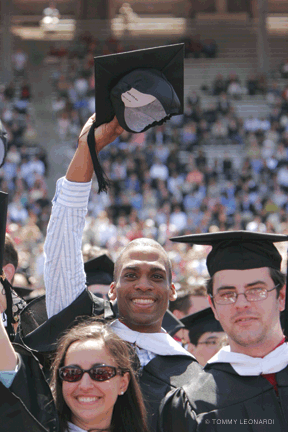
On the heels of an exceptionally cold and rainy April,the sun had returned in full force by May 14 to illuminate Penn’s 251st Commencement exercises. President Amy Gutmann had played the role of hopeful meteorologist the day before, promising “picture-perfect weather” in her remarks at Sunday’s Baccalaureate ceremony, and her vow was honored by clear skies and radiant light.

Over 6,000 graduates strode down Locust Walk and across Franklin Field, their black gowns fluttering with each movement. They posed for pictures and waved to parents and supportive onlookers, who filled the stands in numbers that might have sparked envy among the football squad’s 29 departing seniors. A few young women stumbled while navigating the artificial turf in high heels; others wearing flip-flops bounced cheerfully, clasping hands as they made their way to their seats. Some dental-school grads carried an oversized toothbrush as if it were a class flag. Meanwhile, in the stands, balloons were released periodically during the ceremony to float on the breeze.
Weather was on Gutmann’s mind in more ways than one. Her remarks, besides those in praise of “the great, beautiful class of 2007,” focused on the necessity of finding solutions for urgent environmental concerns.

“Future generations will face an increasingly grim tomorrow unless we get smarter today about treating our environment with greater care,” Gutmann said. “We do not have to rewire human nature in order to help our planet heal itself before it is too late.”
Gutmann summarized several specific ways that Penn is helping to ensure a brighter future, from purchasing nearly a third of its energy from wind-generated power (“making Penn one of the largest private purchasers of wind power in the nation”) to the planned development of the former postal lands bordering the Schuylkill River. “We will transform ugly parking lots to our east into beautiful fields of green,” Gutmann said. “We will reuse stone and paving materials while choosing native plants for landscaping and storm-water management.”

She then turned her focus to Penn’s people, highlighting the assembled graduates’ contributions to environmental solvency: “Let’s hear it for Penn’s Engineers Without Borders, who have brought clean drinking water to a village in Honduras [“Gazetteer,” July|Aug 2006]. Let’s hear it for the Wharton trailblazers who are working to promote sustainable agricultural and economic development throughout the developing world. Let’s hear it for the trailblazers from Penn Nursing and Medicine who have brought expert care and comfort to the poor and elderly of Philadelphia, and hope to the AIDS population of Botswana [“Prognosis Botswana,” Mar|Apr 2007]. And how about all of our Penn students who have spent spring, summer, and winter breaks helping the survivors of Hurricane Katrina rebuild their lives?”
After the conferral of honorary degrees, James Baker took the stage. Baker, who headed the State Department under President George H.W. Bush and served as secretary of the treasury and chief of staff under President Ronald Reagan, was a somewhat controversial selection as the Commencement speaker, due to his stance on U.S.-Israel relations and his role in the Florida recount during the 2000 presidential election. He worked early to appease a crowd anxious to bestow hugs and congratulations on their loved ones.
“I intend to follow advice from Ben Franklin,” he began, “who understood the importance of brevity when he said: ‘He that speaks much, is much mistaken.’” Baker also paid tribute to a nearly universal cornerstone of collegiate life by invoking another Franklin quote: “Beer is living proof that God loves us and wants us to be happy.”
He then got serious, urging the grads to remain mentally and socially active. “Each of you should conscientiously challenge yourself and the world around you,” he said, “because your generation must address complex problems including, but not limited to, international terrorism, the proliferation of weapons of mass destruction, and global warming.”
Baker also stressed the importance of leadership, defining it as “knowing what to do, and then doing it when it is not the popular thing to do, or when no one else may even know you are doing it. And leadership can be telling truth to power.”
He elaborated with three examples: Winston Churchill’s warning against appeasing Adolf Hitler’s lust for power; Reagan’s stance against the Soviet Union and Communism; and George H. W. Bush’s rejection of triumphalism following the collapse of the Iron Curtain.
“Figuratively speaking, [Bush] refused to dance on the Berlin Wall,” Baker said, referring to critics who viewed the event as a chance for the United States to revel in gratuitous celebration over the defeated Communists. Bush instead seized the opportunity to build diplomatic relations and invite the reunified Germany into NATO. Because he knew what was right, and knew how to do it in the face of criticism, Baker argued, the first President Bush exhibited the steadfastness and foresight necessary to make a good leader.

Baker closed by urging the 2007 graduates: “Go forth. Be leaders. Make a personal history that your children, your grandchildren, and your great-grandchildren will remember with honor 100 years from now. Make a history of hard work and care for your families. Make a history of good citizenship, and, when circumstances require it, great citizenship. Represent the best of American leadership. And in every way you can, leave this world a better place than
you found it.”
—Carter Johns C’07




